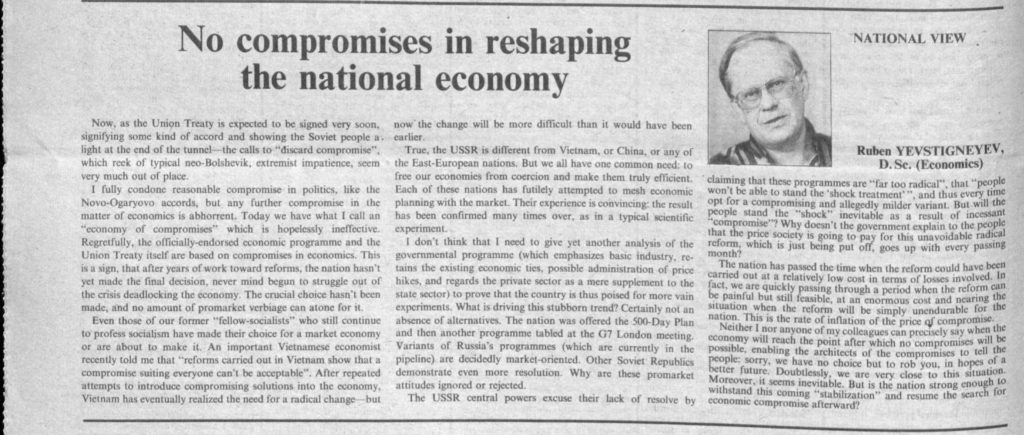By Colton Powaski
Although it was not entirely evident that a coup would take place on August 19,1991, several articles and op-eds published in the August 18-25 edition of the English-language Moscow News demonstrated concern about the future of the Soviet Union. One particularly interesting opinion piece written by economist Ruben Yevstigneyev titled, “No Compromises in Reshaping the National Economy” criticized the inability of the Soviet Union and the Communist Party to firmly decide on a direction for the country. For context, this piece was published one day before the unsuccessful August Coup began. At this time, Soviet President Mikhail Gorbachev was nearing the completion of a new Union Treaty, which was an attempt to salvage the Soviet Union by granting significant concessions to the Soviet Republics. While Yevstigneyev seemed to be somewhat supportive of this move, he remained frustrated at the lack of movement toward a market economy.
Yevstigneyev begins by conceding that he “condones reasonable compromise in politics,” however, he believes compromise in relation to the Soviet economy will prove ineffective. “After years of work toward reforms, the nation hasn’t yet made the final decision, never mind begun to struggle out of the crisis deadlocking the economy. The crucial choice hasn’t been made, and no amount of promarket verbiage can atone for it,” Yevstigneyev writes, criticizing leadership for failing to make a decisive move toward a market economy. Interestingly, Vietnam and China are referenced as communist countries that had made the transition to a more market oriented economy and have had success. “We all have one common need,” Yevstigneyev writes of Vietnam, China, and the USSR, “to free our economies of coercion and make them truly efficient.” Undoubtedly, this makes one wonder how the Soviet Union would have turned out if it had decided to pursue this path.
Yevstigneyev moves on to emphasize the urgency of the need for a radical change: “The USSR [excuses the lack of a decision by] claiming that these programmes are ‘far too radical’ and that people won’t be able to stand the ‘shock treatment’.” Instead, opting for a compromise, Soviet leadership delays the “inevitable” shock as a result of this indecisiveness. Each month that a transition to a market economy is delayed, claims Yevstigneyev, the “shock” will be worse. He continues, “The nation has passed a time when the reform could have been carried out at a relatively low cost in terms of losses involved. In fact, we are quickly passing through a period where reform can be painful but still feasible, at an enormous cost and nearing the situation when the reform will simply be undurable for the nation.” This is a very interesting argument to hear in August 1991, as much of this seemed to come true just months later in the new Russia. Shock therapy led to massive inflation, and eventually, the Russian government defaulted on its debt in 1998 due to a major financial crisis.
This article, which was written before the August Coup, demonstrates two points. First, the collapse of the Soviet Union was not necessarily inevitable or even expected; the situation in 1991 was complex and rapidly changing. Second, it proposes an interesting alternative path that the Soviet Union could have chosen to follow. Yevstigneyev’s article elucidates that the collapse of the Soviet Union could have gone down several different avenues, and that the final outcome was not entirely apparent to Soviet citizens at the time.
Colton Powaski is a junior majoring in Russian, East European, and Eurasian Studies and International Studies. He is an undergraduate fellow at the Havighurst Center.
References:
Yevstigneyev, R. (1991, August 18). “No Compromises in Reshaping the National Economy.”
Moscow News, p. 4.

